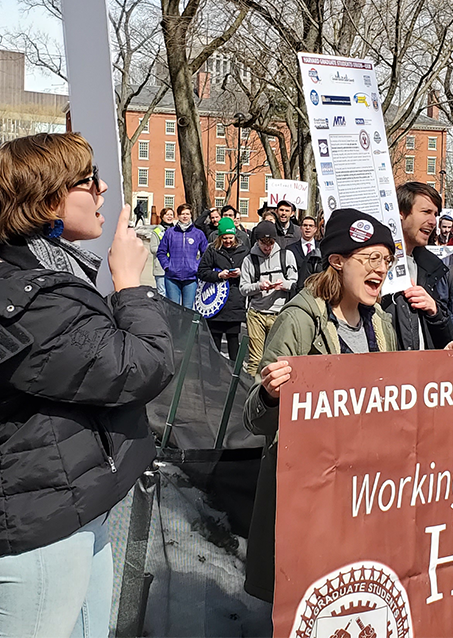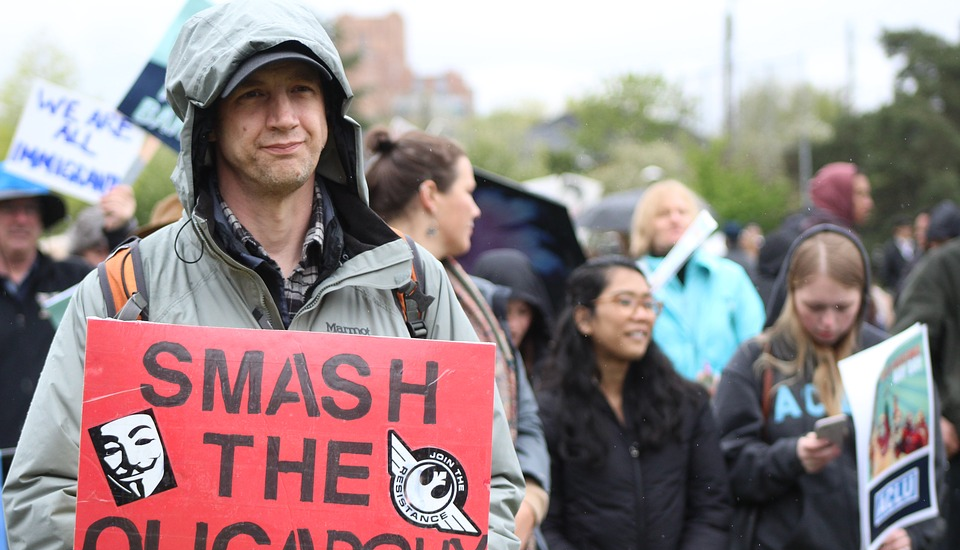HGSU-UAW Current Bargaining Proposals

HGSU-UAW Current Bargaining Proposals
- Travel
- Intellectual Property
- Union Management Committee
- Health and Safety
- Employment Records
- Training
- Recognition
- Severability
- International Students
- Workspace and Materials
- Tax Assistance
- Employee Asistance
- Emergency Grant
- Titles and Classifications
- Housing Side Letter
- Grievance and Arbitration
- Discipline and Discharge
- No Strike/No Lockout
- Job Posting
- Holidays
- Parking and Transit
- Workload
- Employment Appointment Letter
- Employment Appointment Security
We are close to agreement on several articles, but unfortunately there remain disagreements on core issues, including compensation, health and dental care, and arbitration for claims of discrimination, harassment, and retaliation. Below, we provide our most recent proposals and an explanation of our position, beginning with our core issues.
These bargaining proposals reflect our current bargaining position. Compromises will have to be made on both sides in order to reach a tentative agreement. We will update this page as we make new counterproposals.

We have pursued total compensation increases that reflect the value of our work, keep up with the cost of housing, compare favorably with the best examples of first contracts for other academic workers, and would enable Harvard to live up to its status as a world leader in teaching and research. If we hypothetically agreed on a three-year contract, for example, our current proposals would most likely produce salary/stipend increases averaging 6%–7% per year. While this would reflect a strong outcome of a first contract, we believe Harvard should be at the forefront of providing competitive compensation to student workers.
In contrast, Harvard has refused to bargain over total compensation, and the administration’s proposals would not guarantee *any* pay stability for teaching fellows. To be more specific: for teaching fellows in many departments some of their compensation in the form of “pay” and some in the form of “top-ups.” The administration has proposed raising pay (slightly) while maintaining total discretion over top-ups (and summer stipends). Such an arrangement does not allow us to contractually guarantee that student workers who teach will receive the same or better compensation over the whole year.
Harvard has unfortunately disseminated misleading contract examples to justify its lackluster proposals on compensation. Two of those contracts are not first contracts, which hides significant increases negotiated previously. And Harvard’s characterization of the contract at The New School fails to factor in the value of newly-negotiated fee waivers and access to subsidies for health insurance. A more relevant first contract example would be the agreement just completed for UAW Academic Researchers at the University of California, which includes average increases of 6% per year. Harvard’s proposals so far do not reflect the true value of our work or the standards in contracts with universities that have far fewer resources than Harvard.
Union Proposal
University Proposal

University
- The University has made no proposal on this issue.

Every credible observer (e,g. National Academies of Science, Engineering and Medicine, American Association of Universities) agrees that sexual harassment and other forms of discrimination are widespread, underreported, and undermine equity and inclusion in the academic workforce. Even the Harvard president remarked recently, “We must do better.” Our proposal aims to ensure access to a fair procedure for survivors—this means ensuring protection during the investigation process and timely access to a neutral arbitrator if necessary. Even though tens of thousands of other unionized academic student workers – and thousands of other Harvard employees – have such rights, the Administration team has continued to reject the core components of our proposal. Our process does not supplant existing processes, like the Title IX Office, but provides for an additional mechanism that would be adjudicated by people not employed by the administration.
Union
University

We wanted to take a moment to thank you for your guidance in our academic careers. We write to you today to keep you informed about our negotiations and dispel some misinformation, because we believe that our contract will form the basis of a stronger relationship between us.
Campaign History
On April 18th and 19th of last year, we voted to form our union. Since then, the administration has agreed to bargain, and we elected our bargaining committee. We then filled out thousands of surveys in an effort to inform our bargaining committee of our priorities and give them direction for what we would like to see in our contract. Finally, we voted to accept the bargaining goals presented by our bargaining committee.
Negotiations
Though we requested to begin negotiations sooner, we had our first bargaining session with administrators in the middle of October last year. Since then, we have met every other week in an effort to find common ground and come up with a fair contract that ensures an equitable work environment, while helping the administration protect the academic mission of the University. Unfortunately, this process has been slow for a variety of reasons. We have had only 15 bargaining sessions for the entire academic year, along with a few informal (non-bargaining) informational discussions. During those sessions, the responses presented by the administration reflect very little movement towards middle ground, and the span of time between sessions prevent productive discussions. We launched a petition, which a majority of student workers signed, calling on the administration to meet more frequently, so we could achieve our goal of winning a contract which would take effect next fall—a goal that has been attained at universities with similar or larger sizes and for first contracts (such as the University of Washington and the University of California system). The administration has yet to agree to sit at the table with us more frequently. In response to our petition, they have requested that we give up on fundamental rights and protections to speed up the process.

We have communicated our mission clearly:
- We want to address the problem of harassment and discrimination by winning a fair process for survivors, which would include a neutral third party arbitrator issuing decisions.
- We want a compensation package that keeps up with the cost of living, ensuring people are paid fairly for the work they perform and that we can protect our funding packages.
- We want to improve the quality of our healthcare so we are not limited on the number of visits to therapists or specialists, and we want affordable dental coverage (right now we only have it if we pay for it ourselves).
Right now, our proposals reflect our starting position. To find common ground with the administration, we started at what we consider to be a “best case scenario” to then work with the administration to find the center where we can respect both our positions. We are eager to do that work.
Fighting for a contract
Today, you will be hearing about our action, called a work in, where we will be working together in the Smith Center all day, wearing our shirts to show support for our union. We want the administration to hear us clearly: it has been a year since we won our union. It’s time for our contract. Make the time to get this done now. This should not impact our work in any way (in fact, we committed this time to perform work!); however we are getting together to show that this is taking too long and we will continue to raise our voices to get a contract now. We can’t wait any longer.
Stay Informed
We want to keep you informed. While we limit these types of mass emails to once per calendar year, if you want to receive more frequent updates as we progress in bargaining, feel free to sign up for updates on our website (the box halfway down the page). We also created a Frequently Asked Questions for faculty, which you can go back to if you ever have any questions. Please let us know if there are more questions or concerns you’d like us to address on that page.
What you can do to support us
If you would like to express support for us in our contract negotiation process, we ask that you help us make clear to university administrators that our work has value, and we deserve to be compensated fairly for it.
If you wish to help us in fighting for the best contract possible and help us attract the best student workers possible feel free to reach out by responding to this email.
Thanks again for all you do. Together we can ensure that Harvard leads the way—not only in producing world-class research but also in providing a fair and equitable work environment for its workers.
HGSU-UAW Bargaining and Organizing Committee

Union
University
- No proposal offered

Every credible observer (e,g. National Academies of Science, Engineering and Medicine, American Association of Universities) agrees that sexual harassment and other forms of discrimination are widespread, underreported, and undermine equity and inclusion in the academic workforce. Even the Harvard president remarked recently, “We must do better.” Our proposal aims to ensure access to a fair procedure for survivors—this means ensuring protection during the investigation process and timely access to a neutral arbitrator if necessary. Even though tens of thousands of other unionized academic student workers – and thousands of other Harvard employees – have such rights, the Administration team has continued to reject the core components of our proposal. Our process does not supplant existing processes, like the Title IX Office, but provides for an additional mechanism that would be adjudicated by people not employed by the administration.
Union
University

University

Union
University
- The University has not made a proposal on this issue.

Union
University
- The University has proposed that appointments and reappointment would be in their discretion. It has not made its proposal on this issue publicly available.

Union
University
- The University refuses to negotiate on this issue.
University
- The University has not made a proposal on this issue.
University
- The University has made no proposal on this issue.

Union
University

Union
University
Union
University
- The University has not made a proposal on this issue.
Union
University
- The University has not made a proposal on this issue.

Union
University
- The University has not made available publicly its proposal on this issue.

Union
University

Union
University

Union
University

Union
University
- The University has not made a proposal on this issue.


